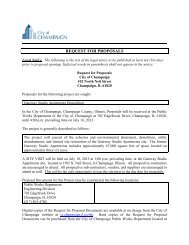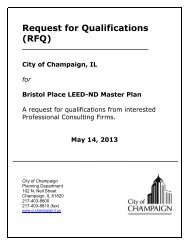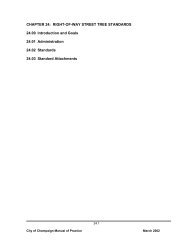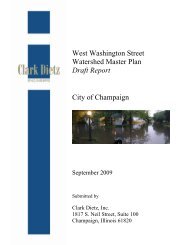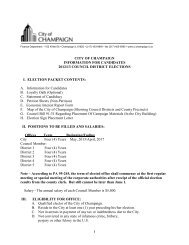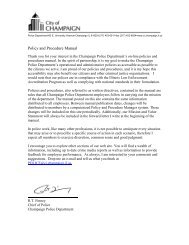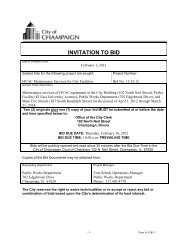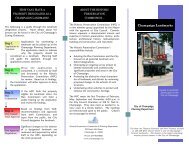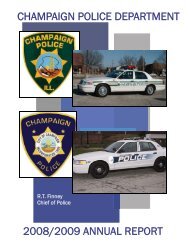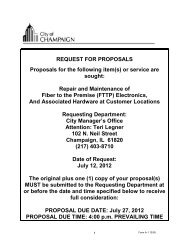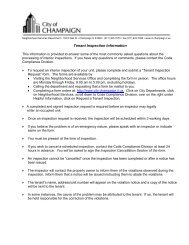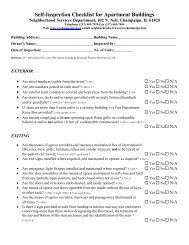2010-2014 Consolidated Plan - City of Champaign
2010-2014 Consolidated Plan - City of Champaign
2010-2014 Consolidated Plan - City of Champaign
Create successful ePaper yourself
Turn your PDF publications into a flip-book with our unique Google optimized e-Paper software.
entering substance abuse treatment improved their housing situation within 6 months <strong>of</strong> treatment(Orwin, RG , Scott C.K., and Ariera, C.R., Transitions through Homelessness and Factors that PredictThem). Prairie Center is keenly aware <strong>of</strong> the need to support clients in the transition from homelessnessto housing. In an evaluation <strong>of</strong> its supportive housing programs, Prairie Center staff found that theseservices frequently result in positive outcomes for persons undergoing addiction treatments. (AckersonB., Prairie Center ACT Program Evaluation)Prairie Center works closely with local service providers including the Salvation Army and TIMES Center toprovide additional long-term treatment options for clients who have completed intensive residentialprograms. Providing supportive living arrangements can shorten the length <strong>of</strong> time required forresidential treatment, effectively expanding capacity without increasing beds.Prairie Center’s experience with the use <strong>of</strong> Assertive Community Treatment models linked to supportivehousing has had positive results. The treatment improves engagement and outcomes for persons withco-occurring disorders. According to the National Institute on Drug Abuse, providers should considerclients with co-occurring disorders to be the "expectation rather than the exception across all services".In cooperation with the Mental Health Center and Greater Community AIDS Project, Prairie Center will beprovides a Permanent Housing and Assertive Community Treatment (PHACT) program, using grantfunding from HUD’s Supportive Housing Program. The program is specifically designed to meet theneeds <strong>of</strong> this population with co-occurring disorders (also referred to as dually diagnosed).The goal <strong>of</strong> the PHACT program is to expand the menu <strong>of</strong> treatment services available to clients withsubstance abuse and co-occurring disorders. Prairie Center will work with its community partners to buildcollaborative relationships to support clients in supportive permanent housing and transitional programs.Persons Diagnosed with HIV/AIDSAccording to the Illinois Department <strong>of</strong> Public Health (IDPH), there are 141 individuals diagnosed withAIDS living in <strong>Champaign</strong> County as <strong>of</strong> January 2005, adding to total <strong>of</strong> 263 cumulative cases since IDPHbegan keeping these records in 1981. Also, there were 115 reported cases <strong>of</strong> individuals being HIVpositive. Carle Hospital is the main health services provider in the region, and partners with the IDPH,Prairie Center, the Mental Health Center, and the Greater Community AIDS Project (GCAP) to provideintensive case management to persons with HIV and AIDS.Greater Community AIDS Project (GCAP) provides support for individuals diagnosed with HIV/AIDS. It<strong>of</strong>fers food assistance, support groups and volunteer assistance, as well as five units <strong>of</strong> transitionalhousing for persons with AIDS. Persons can stay at <strong>Champaign</strong> House (GCAP’s transitional housingfacility) and receive supportive services until their condition stabilizes and they can return to independentliving. The Salvation Army Steppingstone Shelter and TIMES Center <strong>of</strong>ten house homeless men with HIVbut case management services are <strong>of</strong>ten provided by other agencies.The greatest needs <strong>of</strong> this population include affordable permanent housing with supportive services,utility bill assistance, affordable medical insurance, dental care, legal assistance, and transportation tomedical care.Persons with Dual Diagnosis (Mental Illness, HIV/AIDS, and/or Substance Abuse)Supportive services designed specifically to support individuals with two or more targeted disabilities,such as mental illness, HIV/AIDS, and substance dependency, are rare in this community. The MentalHealth Center provides limited residential space for individuals suffering from mental illness. PrairieCenter provides services for persons with substance abuse by providing a residential treatment program.GCAP provides services to persons with HIV/AIDS. All <strong>of</strong> these agencies agree that individuals sufferingwith two or more <strong>of</strong> these diagnoses are the most difficult to house and treat. Many treatment programsonly address one specific disability. Providing comprehensive case management and access to a range <strong>of</strong>46 Needs Assessment: Housing and Homelessness



